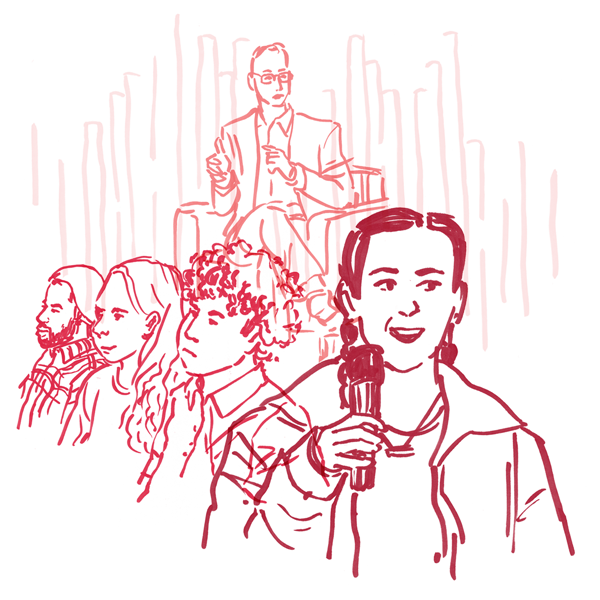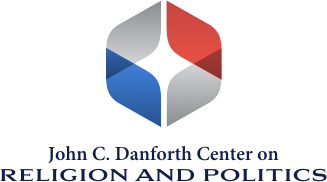God and Politics: From George Washington to Barack Obama
A public lecture by Jon Meacham was the inaugural event for the John C. Danforth Center on Religion and Politics.

Tuesday
4:30–6:00PM
Graham Chapel Washington University in St. Louis
One Brookings Drive
St. Louis, MO 63130
Jon Meacham, former editor of Newsweek and Pulitzer Prize-winning author of American Lion, a biography of Andrew Jackson, addressed the always-contentious role of religion in politics before a crowd of more than 500 at Washington University’s Graham Chapel on Tuesday, Oct. 26.
The speech, entitled “God and Politics: From George Washington to Barack Obama,” was the inaugural event for Washington University’s John C. Danforth Center on Religion & Politics, which opened in January of 2010. The center’s founding director is Wayne Fields, PhD, Lynne Cooper Harvey Distinguished Professor of English in Arts & Sciences.
“We are living in a moment in which we now have a political class of provocateurs whose livelihoods depend upon the perpetuation of conflict, not the resolution of problems,” said Meacham, who began exploring the hot-button topic in 2004, after viewing Mel Gibson’s controversial film, The Passion of Christ. He went on to write American Gospel: God, the Founding Fathers, and the Making of a Nation, published two years later.
Prior to Meacham’s lecture, Chancellor Mark S. Wrighton delivered an introduction written by Fields, who was unable to attend due to a family illness. In his prepared statement, Fields called the event “the beginning of a voyage to explore the very heart of America.” Chancellor Wrighton added that “the university, the St. Louis community, and the nation will be better off” as a result of the center and the dialogue it will promote.
Former Missouri U.S. Senator John Danforth then offered remarks. The center was established in December 2009 with a $30 million endowment from the Danforth Foundation. An ordained Episcopalian priest, Senator Danforth personifies the mingling of faith and public service.
The St. Louis native, whose brother, William Danforth, is a former Washington University Chancellor, opened by recalling the conventional wisdom that two particular subjects should never be discussed in polite company: religion and politics. The center, he noted, will defy that convention.
Danforth, a moderate Republican, has defied that convention for years. In 2005, he wrote an op-ed piece in the New York Times that was critical of his party’s close association with the so-called religious right. It began: “By a series of recent initiatives, Republicans have transformed our party into the political arm of conservative Christians.” He also authored a book entitled Faith and Politics: How the “Moral Values” Debate Divides America and How to Move Forward Together.
“The great work of America has been to hold the diverse interests together in one country, e pluribus unum,” Danforth said. “The word ‘religion’ connotes holding things together, but throughout history, nothing has been more divisive. So, to hold America together, it has been essential for our legal system to maintain Jefferson’s wall of separation between church and state.”
Nonetheless, Danforth noted, since the beginning of our nation’s history, religion and politics have intertwined. More recently, activists as divergent in their views as Martin Luther King Jr. and Jerry Falwell have “brought political voice to their religious calling. They have believed it their duty; we affirm it is their right.”
Of the center, Danforth said, “the more light shed on the relationship of religion to politics, the healthier America will be. What better place to shed light than Washington University?” Danforth then introduced Jon Meacham, whom he described as “a renowned shedder of light.”
“The work you are to be about here is the most significant that can be undertaken, for it is about the two most enduring and formative forces in human life,” Meacham began. He then charmed the audience with a thoughtful and at times humorous presentation that mixed theology, philosophy, historical anecdotes, and calls for tolerance.
Since a landmark 1962 Supreme Court ruling barred school districts from requiring that students recite a government written prayer, Meacham said, the proper place of religion and politics has been debated “with great force and great urgency.”
The right wing, he said, “longs to return to a Christian America of yore,” while the left wing would prefer to “destroy the vestiges of what Jefferson once called ‘monkish superstition.'” Meacham endorsed neither viewpoint, considering them both in opposition to “the system engineered by James Madison, that America would survive in direct relation to its ability to check extremism.”
Meacham also quoted Homer, who said “all men need the gods.” That includes Presidents of the United States, he added, illustrating his point with anecdotes both somber and funny, from Lincoln’s conviction that the Civil War was “an act of divine will” to Eisenhower’s exclamation that “we forgot the goddamn prayer” when a cabinet meeting proceeded without the usual ceremony.
“The wall Jefferson referred to divides church from state but cannot divide religion from politics,” Meacham explained. The framer, he notes, prevents one monolithic institution from imposing itself upon another. The latter, however, need not be so unambiguously distinct.
Although the religious right is often too eager to take advantage of the issue’s blurred lines, he said, adherents to the left often fail to acknowledge that gray areas do, intact, exist. While the separation of church and state is vital to our national identity, Meacham insisted that Americans should not be reluctant to acknowledge and explore the intrinsic interactions of religion and politics for fear of eroding the Jeffersonian wall.
In a question-and-answer session following his lecture, Meacham was asked if the timing of the center’s opening was fortuitous, given the current toxic political environment. If anything, he responded, “the Danforth Center should have been here shortly after Lewis and Clark.”


